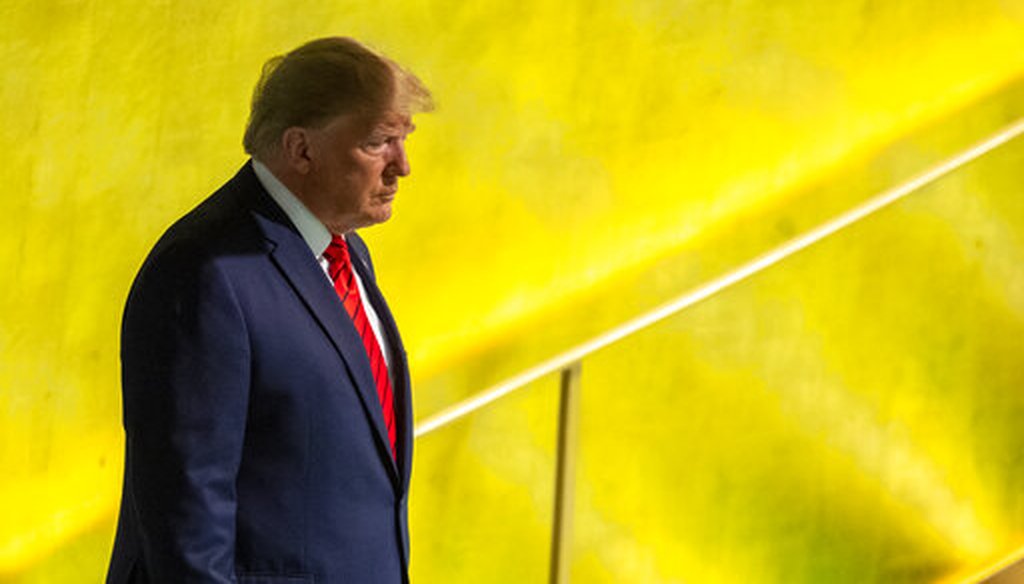Get PolitiFact in your inbox.

President Donald Trump arrives to the United Nations General Assembly at U.N. headquarters on Sept. 24, 2019. (AP/Altaffer)
Government officials have long insisted that whistleblowers should raise concerns via legal whistleblower channels rather than leaking to the press.
But the Trump administration has withheld a complaint filed by an intelligence community whistleblower who did go through the appropriate channels.
The acting director of national intelligence, Joseph Maguire, refused to disclose to Congress the whistleblower’s complaint, which is reportedly about President Donald Trump’s contacts with Ukrainian President Volodymyr Zelensky.
[UPDATE: Read the declassified whistleblower complaint on Ukraine, Biden and Trump]
[Read the Inspector General's letter on the Ukraine whistleblower complaint]
The Trump administration has said Maguire is on firm legal ground, but Democrats have argued that his stonewalling is violating federal laws that protect whistleblowers from retribution.
In a recent Washington Post op-ed, seven House Democrats called for an investigation into the conduct alleged in the whistleblower’s complaint. "Despite federal law requiring the disclosure of this complaint to Congress, the administration has blocked its release to Congress," they wrote.
As of this report’s publication, Congress has not received the complaint, but the Trump administration has indicated it may soon release a redacted version.
We wanted to know what federal law says about sharing whistleblower complaints with Congress, so we examined the statute and talked to legal experts. We found that the law does require disclosure, but there are some nuances.
What does the whistleblower law say?
The Intelligence Community Whistleblower Protection Act protects intelligence officials from retribution for flagging what they believe to be government misconduct. The law was passed in 1998 and refined in 2010 with the establishment of the Office of the Intelligence Community Inspector General.
The law lays out a procedure that lets officials blow the whistle internally without compromising classified information. As long as intelligence whistleblowers go through legal channels when filing a complaint, they are protected from being fired or facing criminal prosecution.
Specifically, the law says intelligence whistleblowers should submit their complaints to the inspector general of the intelligence community, who is supposed to act independently.
The inspector general is required to review complaints within 14 days and determine whether they are of "urgent concern," meaning they report a serious problem, abuse, or violation of the law "relating to the funding, administration, or operation of an intelligence activity within the responsibility and authority of the director of national intelligence involving classified information."
Any credible complaints must then go to the director of national intelligence, or DNI, who has seven days to forward them to the intelligence committees in Congress along with any relevant documents.
In the event that the inspector general ignores a complaint or determines that it is not credible, a whistleblower can reach out to Congress directly, but only after he or she alerts the inspector general and receives guidance from the DNI on how to keep those communications secure.
How the Trump whistleblower’s complaint was stalled
As of this writing, the whistleblower has not been identified and the contents of the complaint remain under wraps.
We do know that on Aug. 12, an unnamed intelligence official filed a complaint to Michael Atkinson, the inspector general of the intelligence community, according to a letter and subpoena from Democratic Rep. Adam Schiff, chairman of the House Intelligence Committee.
According to news reports, the complaint details multiple actions by Trump, including communications he had with Ukraine’s Zelensky about an investigation into former Vice President Joe Biden’s son, Hunter, who worked for an oil company in Ukraine.
The White House released a readout of a July 25 phone call between Trump and Zelensky, in which Trump told Zelensky he should work with his personal lawyer, Rudy Giuliani, and Attorney General Bill Barr to investigate the younger Biden.
Atkinson, a Trump appointee, found the whistleblower’s complaint credible and a matter of "urgent concern," according to Schiff’s letter. He forwarded the complaint to Maguire, the acting director of national intelligence.
But Maguire did not turn the complaint over to the intelligence committees, and he also refused to guide the whistleblower on how to contact the committees directly, according to the letter.
Lawyers for the DNI said they determined with the help of the Justice Department that the conduct described in the complaint was outside the scope of the whistleblower statute. In two letters to Schiff, they said the complaint "did not concern allegations of conduct by a member of the intelligence community or involve an intelligence activity under the DNI's supervision."
For his part, Atkinson said in a letter to Schiff that he disagreed with the DNI’s determination but was bound to abide by it.
Can the DNI override the inspector general and withhold a complaint?
The Intelligence Community Whistleblower Protection Act does not outline what should happen in the event that the DNI blocks the release of a complaint that the inspector general finds credible. But legal experts said the inspector general should have had the final say.
"The whistleblower protection statute says that the director of national intelligence ‘shall’ produce the complaint to Congress if the inspector general finds the complaint credible and logs urgent concern. That has happened," said Barbara McQuade, professor of law at the University of Michigan and the former U.S. attorney for the Eastern District of Michigan.
Irvin McCullough, a national security analyst at the Government Accountability Project, a nonprofit whistleblower advocacy organization, said the DNI can disagree with the inspector general’s findings but cannot challenge them.
"To do so would be a body-blow to the intelligence community inspector general’s independence," he said. "If the executive branch could overrule an independent inspector general with the stroke of a pen, then the inspector general would be essentially toothless."
In an op-ed in the New York Times, Stephen Vladeck, professor of law at the University of Texas, said the DNI’s argument that it can override the inspector general’s determination "flies in the face of the plain text, structure and purpose" of the whistleblower protection law.
The point of the law is "to remove the intelligence community’s political leadership from having a say over whistle-blower complaints," Vladeck wrote.
But Robert Litt, former general counsel to the DNI under Obama, said the DNI’s consultation of the Justice Department’s Office of Legal Counsel could impact the way the law is applied.
In a post on Lawfare, a legal blog, Litt wrote that Office of Legal Counsel opinions are considered binding interpretations of law within the executive branch. If the Justice Department opined that the whistleblower’s complaint was not an "urgent concern," then the Trump administration could argue that that opinion is final.
Plus, if the Trump administration asserts executive privilege over the complaint, the DNI would likely be bound to honor it, Litt said. As we’ve noted, past Supreme Court rulings offer limited guidance for how executive privilege could play a role in this scenario.
Could the whistleblower or inspector general go around the national intelligence director?
The whistleblower protection laws are no more clear on whether the whistleblower — or the inspector general — could share the complaint with the congressional intelligence committees without first receiving the appropriate guidance from the DNI.
But national security lawyer Kel McClanahan wrote in a blog post that the whistleblower "would be on strong constitutional and statutory footing" if he or she brought the complaint directly to Schiff, but noted that doing so still risks consequences, such as the loss of a security clearance.
McCullough noted that the whistleblower would likely have to reveal his or her identity to the DNI’s office in order to disclose the complaint, which could invite retaliation, even if the law protects against it. (The whistleblower is represented by his or her own legal team.)
According to Politico, one of the whistleblower’s lawyers has been in conversation with the congressional intelligence committees about the whistleblower appearing to testify. But the Trump administration’s potential release of the redacted complaint could come first.
Either event in the days ahead would give Congress more information about the substance and details of the complaint.
RELATED STORY: Trump’s Ukraine call, a whistleblower and the Bidens: What we know, what we don’t
Our Sources
The Washington Post, "Seven freshman Democrats: These allegations are a threat to all we have sworn to protect," Sept. 24, 2019
The Washington Post, "Read the intelligence community inspector general’s letter questioning the determination to withhold a whistleblower complaint from lawmakers," Sept. 19, 2019
U.S. Congress, "H.R.3829 - Intelligence Community Whistleblower Protection Act of 1998," May 12, 1998
U.S. House of Representatives, Permanent Select Committee on Intelligence, Letter from Rep. Adam Schiff to acting Director of National Intelligence Joseph Maguire, Sept. 13, 2019
Office of the Director of National Intelligence, Letter from acting Director of National Intelligence Joseph Maguire to Rep. Adam Schiff et al., Sept. 13, 2019
Office of the Director of National Intelligence, Letter from acting Director of National Intelligence Joseph Maguire to Rep. Adam Schiff, Sept. 17, 2019
Lawfare, "What the Latest Reports Say About the Whistleblower Complaint," Sept. 20, 2019
Jack Goldsmith on Twitter, Sept. 19, 2019
Susan Hennessey on Twitter, Sept. 19, 2019
Marty Lederman on Twitter, Sept. 19, 2019
Just Security, "Q&A on Whistleblower Complaint Being Withheld from Congressional Intelligence Committees," Sept. 17, 2019
Just Security, "Intel Whistleblower Complaint Q&A Part 2: Constitutional Boogaloo," Sept. 20, 2019
The New York Times, "White House Seeks Deal for Whistle-Blower to Speak to Congress," Sept. 24, 2019
Politico, "White House preparing to release whistleblower complaint to Congress," Sept. 24, 2019
Politico, "Whistleblower wants to appear before Congress, Dems say," Sept. 24, 2019
The Washington Post, "The whistleblower complaint has Congress and Trump at an impasse. Here’s what the law says," Sept. 22. 2019
The New York Times, "Why the Whistle-Blowing Process Is Breaking Down," Sept. 20, 2019
Politico, "‘A deficiency in the law’: How Trump accidentally exposed a whistleblower loophole," Sept. 19, 2019
PolitiFact, "Trump’s Ukraine call, a whistleblower and the Bidens: What we know, what we don’t," Sept. 23, 2019
Email interview with Barbara McQuade, University of Michigan law professor and former U.S attorney, Sept. 23, 2019
Email interview with Irvin McCullough, national security analyst at the Government Accountability Project, Sept. 24, 2019
Email interview with Kel McClanahan, a national security lawyer, Sept. 24, 2019
Email interview with Robert Turner, associate director of the Center for National Security Law at the University of Virginia, Sept. 24, 2019






























